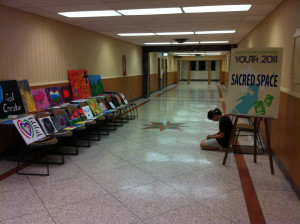 My buddy Sam Davidson at Cool People Care highlighted this 10 courageous actions to building community in your neighborhood community. It had me thinking that, 1. community is what people are looking for 2. people really do not know how to go about it anymore because we’ve spent a few generations segmenting our lives to our own personal bubbles. So when it comes to images of church, do we actually know how to build community? We might not..
My buddy Sam Davidson at Cool People Care highlighted this 10 courageous actions to building community in your neighborhood community. It had me thinking that, 1. community is what people are looking for 2. people really do not know how to go about it anymore because we’ve spent a few generations segmenting our lives to our own personal bubbles. So when it comes to images of church, do we actually know how to build community? We might not..
So here’s some added thoughts to this list of actions for those who would be called ‘people of the church.’
- Take interest in other people’s passions as much as you want them to be interested in yours. We all have ideas for how life should be. The thing is that, unless we are unsurpassed geniuses, we only see a small part of the picture. Asking others what they see can only enhance understanding. [Tough one, stop concerning yourself first and get on with someone else and the things that are important to them. We probably do this very well for a children, but when it comes to our neighbor?..]
- Become a mentor to others less involved in their community. In every community there is a small, overworked group of leaders who try to figure out everything for everyone. They go to all the meetings and take on huge loads of work while others are silent—until it is time for them to complain. This will not do. If you are such a leader, mentor someone with less experience. If you are not, approach someone and ask them to mentor you. [I have many gifts and skills that could be shared. Beyond my youth work, which I do this often, do I do that in avenues for people in my neighborhood? No, and that is not something I’m proud of. Could do better to share skill sets to others in my community and who knows the impact that could be.]
- Support a cause with no direct personal benefit. We are involved with things we care about the most. That’s natural. My experience tells me, however, that the most interesting and possibly most important discoveries happen in the spaces between interests and disciplines and ideologies. Step outside your natural zone—it’s necessary for uncovering new solutions. [Giving of self with out some “return on investment” is tough cultural impulse to break from. We go to church because we ‘get something’ be it uplifting feeling from worship, friendships, networking, etc. Love doesn’t expect or need a return.]
- Invite “them” to your meeting. It is convenient to show our importance by pitting “us” against “them.” But “they” may have insights that will help us better understand the problem and appreciate the marvelous tensions that form a healthy community. [With the diverse & numerous platforms of niche news and neighborhoods we have made it easier to only focus on & affirm our current viewpoints. If you are conservative church type what would it be to go to the liberal group meetings on/about the church? Is it scary to think you will find out they are real people like you?]
- Reject the tendency to blame. Everyone plays a role in the problem and everyone must participate in the solution. Practice compassion towards those who, like ourselves, unwittingly contribute to the problem they wish to solve. [We play victim many times. Accountability is hard to come by so much that it is treated in very conflicting manners when it happens. Poverty is an issue and instead of blaming some group or a system, what would happen if we all assumed responsibility for doing our part of the solutions.]
- Confront internal contradictions. Claiming that the problem is someone else’s doing conveniently absolves us from doing our part. If I drive my car to a transportation meeting and complain about traffic jams, it’s necessary that I acknowledge my contribution to that traffic. At the very least, acknowledge the irony of the situation. [Chances are we do not even realize the many depths to which we play a part in the problem]
- Practice industrial-strength listening. Do not react until you’ve received. [Holy Listening or Spiritual Direction should be part of every Christian’s practice]
- Render unto community… Shrink your home to what is necessary and conduct the rest of your life in the community. For example, resist a “theater” room and visit your local theater instead. Anytime you bump into others you make your community a bit stronger. [How big is your church that it becomes so much the focus of your ministry that you have no energy to do anything outside in the community?]
- Clarify your image of the future. I find that most decisions we make are shaped by impulses so deeply ingrained we fail to be aware of them. Unexamined impulse is prejudice. Examined impulse, once confirmed, is guidance that leads to something better. Examine your embedded assumptions, embrace the relevant ones, and discard the rest. What remains is a clear intuition, an image of a possible future. Then engage with others to make it a reality. [Know thy self. As Jesus asks, “Who do people say I am?” “Who do you say I am?”]
- Resist the temptation to choose between the ideal and the reality. Hold them both in your awareness. Learn to enjoy the creativity and humor this tension offers. It can be quite funny. [You can’t do everything otherwise you’ll get yourself in trouble, you can’t do nothing otherwise you are not living up to the calling of Jesus Christ.]
I went to listen to some songwriters perform a few weeks ago. In Nashville, events like these are easy to find. What I like most about these events is listening to the stories behind the songs. Usually, you’ll hear something like, “When I wrote this song with Joe and Tom…” or “As Jane and Wanda and I wrote this…” Go to enough of these and listen to enough of these stories and you’ll realize that no one writes songs alone. Look at the liner notes to any CD in your collection and you’ll see.
And, in Bill Gates’ recent piece for the BBC, he wrote:
Communication skills and the ability to work well with different types of people are very important too. A lot of people assume that creating software is purely a solitary activity where you sit in an office with the door closed all day and write lots of code. This isn’t true at all. Software innovation, like almost every other kind of innovation, requires the ability to collaborate and share ideas with other people, and to sit down and talk with customers and get their feedback and understand their needs.
In other words, we’re not alone. We can’t be our best alone. We need community like we need air, shoes and wi-fi.
There’s a difference, however, between community and communitas. Community can simply mean some sort of loose grouping, without any kind of real connection. Our neighborhood, our city, or our classmates can be considered our community. But we can still not know anything about another person in this community.
What we need then, is communitas. This is a Latin word that describes a more intense type of community – one that usually undergoes some sort of bonding experience or rite of passage together. Fraternities and sororities are a shallow form of this, sharing a common initiation ritual. Guys who stormed the beach at Normandy and firefighters are a more intense version.





